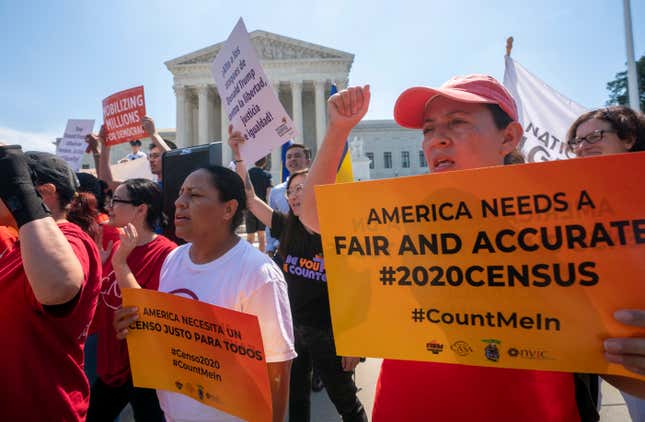
On the last day of its term, the nation’s highest court churned out two major rulings: One concerning the U.S. Census, the other, the future of gerrymandering.
Let’s start with gerrymandering—that is, when a political party shapes the boundaries of an electorate so it favors them—which the Supremes already ruled could not be done on the basis of race. The question before them was whether political gerrymandering, that is, gaming political maps so they disproportionately benefited their parties—was just as unconstitutional.
In a decision splitting the court between its five-judge conservative majority and its liberal wing, SCOTUS ruled that political gerrymandering was permissible, and that federal courts had no business interfering in the will of state legislatures on this matter.
On its face, the decision might seem like one of those “what’s good for the goose is good for the gander” situations. After all, this ruling would apply equally to states run by Democrats as it would states where the GOP holds all the power.
But therein lies the rub: Republicans have control over FAR MORE states than Democrats do. CNN, citing the National Conference of State Legislatures, reports that Republicans control more than 30 of 49 partisan legislatures in the country (Nebraska, apparently, does some other shit). Of that 30, 22 also have a Republican governor.
So yeah, hope everyone in Alabama, Ohio, Florida, and Georgia enjoys having a Republican-controlled government forever-ever.
The NAACP had some thoughts about this decision, which they shared in a press release:
“Exercise of the franchise, which many fought and even died for, must not be reduced to a political charade in which the outcomes are predetermined,” wrote NAACP President and CEO Derrick Johnson. “In America, voters should choose their representatives instead of representatives choosing their voters.”
He added, “This is a dereliction of duty in protecting our democracy.”
But the Supreme Court also delivered a major setback to the Trump administration today, ruling in another 5-4 decision that the White House’s reasoning for including citizenship in the 2020 Census wasn’t sufficient.
Chief Justice John Roberts, who penned the high court’s majority opinion (he was joined by the court’s liberal justices this time), wrote that the Trump administration’s rationale for adding a question concerning U.S. citizenship “appears to have been contrived,” according to the New York Times:
Executive branch officials must “offer genuine justifications for important decisions, reasons that can be scrutinized by courts and the interested public,” the chief justice wrote. “Accepting contrived reasons would defeat the purpose of the enterprise. If judicial review is to be more than an empty ritual, it must demand something better than the explanation offered for the action taken in this case.”
Lawyers for the Trump administration argued that the citizenship question was necessary in order to enforce the Voting Rights Act. Now, me myself, a woman who once considered law school for all of eight seconds before realizing I had neither the fortitude nor the willpower to sell the number of eggs necessary to pay off six figures in student debt, read Justice Roberts’ statement as “this rationale sounds like a whole-ass lie.” But that’s just my minority opinion.
Multiple judges before Chief Justice Roberts ruled that the evidence provided didn’t support Commerce Secretary Wilbur Ross’ rationale for including the question. Instead, documents shared during the Supreme Court case appeared to show that the citizenship question was constructed as a way to suppress Latinx political power.
According to the Times, documents showed Ross “discussed the citizenship issue early in his tenure” with former advisor Steve Bannon and Kansas Secretary of State Kris Kobach, both of whom are considered key figures in shaping Trump’s draconian immigration policies.
Evidence was also presented concerning a GOP strategist, Thomas Hofeller, who met with a current Census Bureau staffer in 2015 about the addition of a citizenship question.
From the Hill:
Hofeller, who died last year, had also conducted an unpublished 2015 study finding that asking about citizenship could help Republicans and non-Hispanic whites in redistricting while hurting Hispanic communities and Democrats, according to the documents.
Other evidence suggests that Hofeller may have helped draft a memo circulated within the Trump administration arguing in favor of the citizenship question.
The Times, citing government experts, reports that if a citizenship question were included, it could spook immigrants from filling out the census—and about 6.5 million people could be undercounted.
“That could reduce Democratic representation when congressional districts are allocated in 2021 and affect how hundreds of billions of dollars in federal spending are distributed,” the paper writes.
In effect, the Supreme Court allowed a pathway today for a fairer census. Free and fair elections? Not so much.

